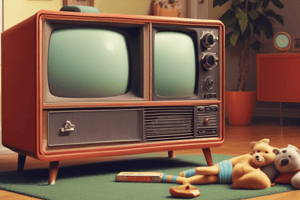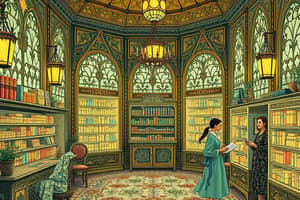Podcast
Questions and Answers
What were Americans caught up in?
What were Americans caught up in?
economic boom
What were material goods equated with?
What were material goods equated with?
- Wealth
- Education
- Success (correct)
- Happiness
What allows Americans to keep up with their neighbors?
What allows Americans to keep up with their neighbors?
credit
What was the first credit card?
What was the first credit card?
What marketing strategy convinces American consumers they need new and better products?
What marketing strategy convinces American consumers they need new and better products?
Critics claimed Americans were becoming a _____ society.
Critics claimed Americans were becoming a _____ society.
What was the number of TV sets by 1960?
What was the number of TV sets by 1960?
Name examples of traditional American TV shows.
Name examples of traditional American TV shows.
What are examples of family shows portraying middle-class suburban life?
What are examples of family shows portraying middle-class suburban life?
Who questioned the behavioral norms of adolescents in the 1950s?
Who questioned the behavioral norms of adolescents in the 1950s?
What were the behavioral norms of adolescents in the 1950s?
What were the behavioral norms of adolescents in the 1950s?
Name shows that depict juvenile delinquency.
Name shows that depict juvenile delinquency.
What new musical genre was influenced by rhythm and blues?
What new musical genre was influenced by rhythm and blues?
Who were the rockers of the 50s?
Who were the rockers of the 50s?
When does Rock n Roll music debut?
When does Rock n Roll music debut?
What term is used for Rock n Roll?
What term is used for Rock n Roll?
How many books were sold per day?
How many books were sold per day?
What was the number of national TV networks?
What was the number of national TV networks?
Name popular genres of TV shows in the 1950s.
Name popular genres of TV shows in the 1950s.
What was TV criticized for causing?
What was TV criticized for causing?
What fueled the consumerism binge of Americans?
What fueled the consumerism binge of Americans?
What shift was seen from 'mom and pop' locally owned businesses?
What shift was seen from 'mom and pop' locally owned businesses?
How did mass media reinforce traditional roles?
How did mass media reinforce traditional roles?
What was the struggle against conformity in the 1950s?
What was the struggle against conformity in the 1950s?
What did Americans want in their government?
What did Americans want in their government?
Who were the beatniks?
Who were the beatniks?
Who were the writers who embodied the 'beat' message?
Who were the writers who embodied the 'beat' message?
Where were the centers of the 'Beatnik' Generation?
Where were the centers of the 'Beatnik' Generation?
Who criticized the youth?
Who criticized the youth?
What did the beatniks seek through Eastern philosophy?
What did the beatniks seek through Eastern philosophy?
How did the beatniks heavily influence the 1960s?
How did the beatniks heavily influence the 1960s?
What was the result of the GI Bill?
What was the result of the GI Bill?
What were the AFL and CIO?
What were the AFL and CIO?
What exploded during the 1950s?
What exploded during the 1950s?
By what year were there more white-collar jobs than blue-collar in the US?
By what year were there more white-collar jobs than blue-collar in the US?
What defines the ideal modern woman?
What defines the ideal modern woman?
What defines the ideal 1950s man?
What defines the ideal 1950s man?
Who wrote The Organization Man?
Who wrote The Organization Man?
What does The Organization Man define?
What does The Organization Man define?
Who conducted a study on sexual behaviors during the 1950s?
Who conducted a study on sexual behaviors during the 1950s?
Churches become less interested in ___ but more interested in ____.
Churches become less interested in ___ but more interested in ____.
Who is the author of Life is Worth Living?
Who is the author of Life is Worth Living?
Who is the author of The Power of Positive Thinking?
Who is the author of The Power of Positive Thinking?
Who warned against the evils of Communism?
Who warned against the evils of Communism?
Name examples of religious movies.
Name examples of religious movies.
What did Brown vs. Board of Education overturn?
What did Brown vs. Board of Education overturn?
What year was Brown vs. Board of Education?
What year was Brown vs. Board of Education?
What was declared unconstitutional regarding public schools?
What was declared unconstitutional regarding public schools?
States are ordered to ______.
States are ordered to ______.
Who was ordered by a Montgomery bus driver to give up her seat?
Who was ordered by a Montgomery bus driver to give up her seat?
Flashcards are hidden until you start studying
Study Notes
Economic Landscape
- The 1950s experienced an economic boom, greatly influencing American lifestyles.
- Material goods became synonymous with success as consumer culture flourished.
- The rise of credit allowed consumers to maintain appearances and keep up with their neighbors.
Consumer Innovations
- The Diner's Club Card emerged as the first credit card, revolutionizing spending.
- Planned obsolescence became a marketing strategy persuading consumers to frequently upgrade products.
- Critics labeled Americans as part of a "throwaway" society due to disposable consumer habits.
Television and Entertainment
- By 1960, approximately 50 million TV sets were in use across the U.S.
- Traditional American television examples included shows like Superman and The Lone Ranger.
- Family-centric sitcoms like I Love Lucy and The Honeymooners depicted middle-class suburban life.
Youth Culture and Rebellion
- The Beatniks challenged adolescent norms, questioning authority and conformity.
- Popular films such as The Wild One and Rebel Without a Cause showcased themes of juvenile delinquency.
- Music genres like Rock n Roll, debuting in 1951, drew from rhythm and blues influences.
Prominent Figures in Rock n Roll
- Artists such as Elvis Presley and Chuck Berry became iconic figures of the Rock n Roll movement.
- The term "race music" was used to describe early Rock n Roll.
Publishing and Media
- An estimated 1 million books were sold daily during this period, reflecting a booming reading culture.
- There were three national TV networks, showcasing a variety of genres like sitcoms, westerns, quiz shows, and sports.
- Television faced criticism for being a "Vast Wasteland," reflecting concerns over media content.
Shifts in Consumer Behavior
- Credit cards and shopping malls fueled rampant consumerism in American culture.
- A transition from locally-owned "mom and pop" businesses to nationally held franchises occurred.
- Traditional roles of women as wives and mothers were reinforced through mass media representation.
Social Movements and Counter-Culture
- A struggle for individualism marked the 1950s, reflecting a desire to resist conformity.
- Americans increasingly demanded enhanced social spending and attention to poverty-related issues.
- Beatniks rebelled against societal norms and sought enlightenment through Eastern philosophies and sometimes drug use.
Literary Voices of the Beat Generation
- Notable writers such as Jack Kerouac and Allen Ginsberg epitomized the beat message.
- San Francisco and Greenwich Village, NY became the centers of the Beatnik Generation.
- John Clellan Holms was critical of youth culture during this period.
Changes in Employment
- Post-GI Bill led to more white-collar jobs surpassing blue-collar jobs, particularly by 1956.
- Major unions like AFL and CIO supported the workforce, providing industrial jobs with middle-class incomes.
Family Dynamics and Societal Expectations
- The ideal modern woman of the 1950s was portrayed as married, nurturing, and community-oriented.
- The ideal man was depicted as the family provider and protector.
- William H. Whyte Jr. authored "The Organization Man," defining the middle-class male as a societal standard.
Religious Influences
- Dr. Alfred Kinsey conducted influential studies on sexual behaviors in the 1950s.
- Churches became less focused on doctrine and more on socializing within communities.
- Prominent figures like Catholic Bishop Fulton J. Sheen and Norman Vincent Peale authored motivational works, contributing to religious discourse.
Civil Rights Movements
- Brown v. Board of Education (1954) overturned the "separate but equal" doctrine, declaring school segregation unconstitutional.
- The ruling aimed to integrate public schools, addressing systemic racial discrimination.
- Rosa Parks became a significant symbol of the civil rights movement after refusing to give up her bus seat.
Studying That Suits You
Use AI to generate personalized quizzes and flashcards to suit your learning preferences.




